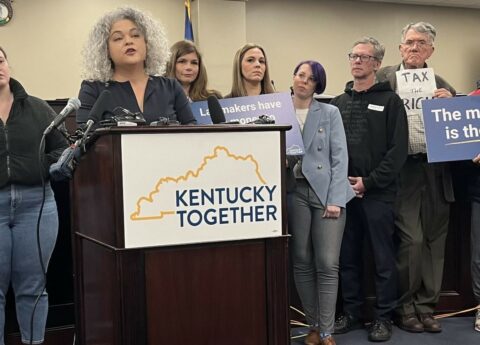“The now-failed Senate ‘skinny’ proposal was an even weaker version of the deeply inadequate plan Senate leaders put forward at the end of July. Doing less when we need more is no way to address the recession of our lifetime. By shortchanging the nation at a time of unprecedented need, the plan would’ve made the slump deeper, longer and more painful.
The plan left out general aid to state and local governments, which would result in cuts to services like schools and health that are always essential, but especially in this crisis. It failed to include much-needed monies for food and housing assistance, increasing hardship at a time when thousands more Kentucky families are fighting homelessness and hunger. And by cutting the $600 expanded unemployment benefits in half and allowing benefits to end prematurely, the skinny proposal would’ve punished the massive numbers of Kentuckians who have been laid off through no fault of their own.
Kentucky needs a robust congressional aid package that allows families and the economy to endure the monumental challenge in front of us. The Senate skinny proposal fell far short of that.”
-Jason Bailey, Executive Director
Key facts:
- Housing and Food Assistance: Of the 43% of Kentuckians who told the Census Bureau in August they have lost household employment income in this crisis, 1 in 6 say they “sometimes” or “often” do not have enough to eat. And 34% of Kentucky renters have “no” or only “slight” confidence in their ability to make next month’s rent. The new aid package must include an increase in SNAP benefits and monies for housing assistance.
- Extended Unemployment Benefits: Job growth slowed in the most recent month in Kentucky, and the state’s real unemployment rate (counting people who have left the labor force since February) is a historically high 16%. Black Kentuckians have been laid off at higher rates than white Kentuckians. Congress should extend the $600 in supplemental unemployment benefits until the economy is truly recovering.
- Aid to State and Local Governments: Kentucky has already reduced its state and local government workforce (including universities and other education employment) by 30,000 jobs since this crisis began, according to Bureau of Labor Statistics data. More cuts are on the way if aid to state and local governments is not forthcoming. The state projects a revenue shortfall of $290 million to $746 million this fiscal year (General Fund and Road Fund) not counting the extra costs the state is taking on, such as providing healthcare to the 226,000 more people covered under Medicaid since the pandemic began. Congress must provide much more in aid to states and localities and increase the share of Medicaid costs the federal government pays.



